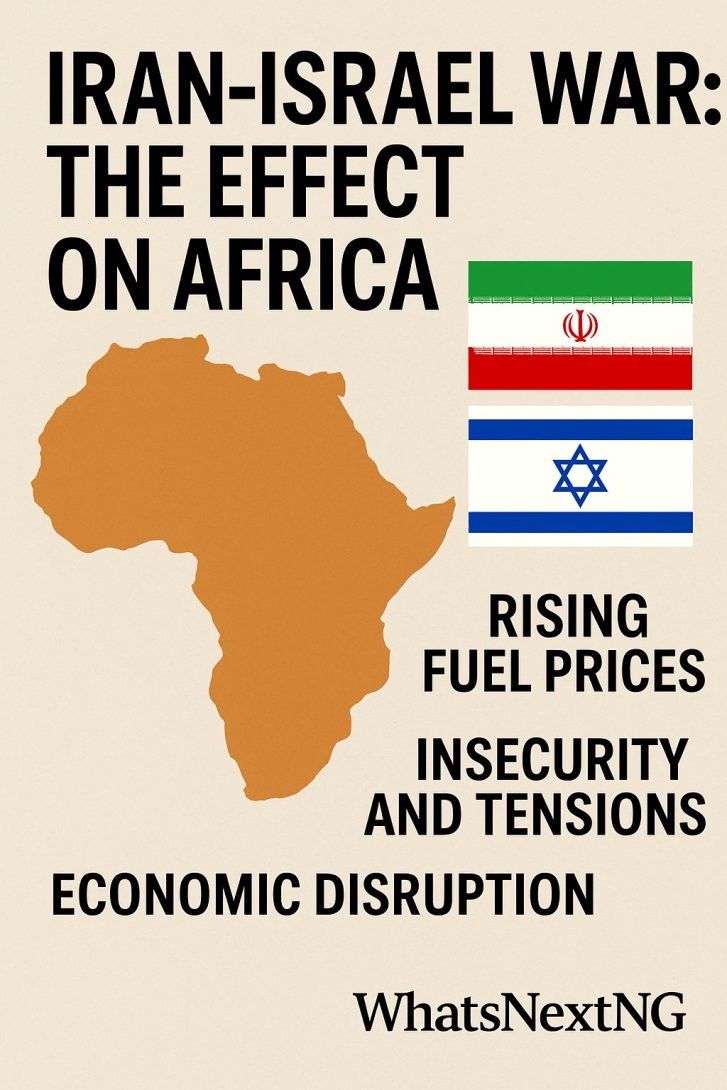
The Silent Earthquake Shaking Africa’s Future: Iran-Israel War
we all know that as missiles fly and alliances tighten in the Middle East, the war between Iran and Israel is no longer a distant conflict, it’s an unfolding crisis with direct and devastating implications for Africa. While global powers focus on oil routes, nuclear threats, and diplomatic sanctions, Africa stands quietly at the edge of a geopolitical volcano, already feeling the heat, especially for Nigeria.
From spiking fuel prices, rising insecurity, and religious tensions, to the manipulation of proxy forces and weakened economies, the Iran-Israel war could become Africa’s next invisible war one fought without bullets, but with economic pressure, social instability, and ideological division.
And the worst part? African leaders are silent, as if pretending not to see the storm makes them immune to it.
The Middle East Burns, But Africa Pays the Price
As we all are pressing for peace in the African states are silent about the war, we are the ones really paying for the price of it because While the West and Gulf states scramble to defend their interests, Africa is absorbing the economic and political aftershocks.
1. Fuel Prices Are Skyrocketing
The war has disrupted global oil trade routes, especially in the Strait of Hormuz and surrounding maritime regions vital chokepoints for crude oil transport. With global oil prices surging past $120 per barrel, African nations who depend on imported refined fuel are bleeding.
Countries like Nigeria, Ghana, Kenya, and Senegal are experiencing renewed fuel scarcity, high transportation costs, and inflation. Food prices have jumped, currencies are weakening, and the burden is again falling on the poorest citizens.
2. Proxy Conflicts Are Creeping into Africa
Africa is no stranger to proxy warfare, and this conflict opens dangerous doors. Iran has historical ties with Hezbollah-influenced groups in Sudan and the Islamic Movement in Nigeria (IMN), while Israel has long collaborated with military and intelligence agencies in East Africa (especially Ethiopia and Uganda).
This war risks turning African soil into a silent battleground for ideological influence, especially in the Horn of Africa, Sahel, and parts of West Africa where governance is weak and religious divides are sharp.
ALSO READ
Tinubu Hands Over ECOWAS Leadership to Sierra Leone’s Bio
North Carolina Declares June 14 as Igbo Day
Rising Religious Tensions The Next Threat?
One of the most underreported dangers is the religious fallout.
The Iran-Israel war isn’t just political it’s deeply sectarian, with Sunni and Shia tensions reigniting in the Muslim world. In Africa, this could inflame divisions between Christian, Sunni, and Shia communities, especially in Nigeria, Chad, Niger, and parts of Tanzania.We are all aware that Africans are good religious lovers who go lengths for it.
Online radicalization is increasing, with Iran-backed propaganda targeting disillusioned African youth, and Islamist extremist groups using the conflict as moral justification for violence.
The longer the war drags, the higher the risk of religiously fueled unrest across African cities and universities.
Sanctions and Trade Shocks: Africa’s Economy Under Attack
Western sanctions on Iran and retaliatory measures affecting Israel’s trade are already choking global commerce, and Africa with its dependence on foreign aid, fuel, and technology imports is trapped in the crossfire.
- African importers are paying more for goods and fuel.
- Investors are becoming jittery, withdrawing funds from emerging markets.
- Local currencies are falling against the dollar, worsening debt burdens.
- Ports in Egypt, Djibouti, and Morocco are experiencing shipping delays, slowing down entire supply chains.
What’s worse is that global focus has shifted away from Africa’s crises Sudan’s civil war, Congo’s instability, and Ethiopia’s fragile peace are now lower priorities on the world stage.
Is Africa Being Ignored Again?
Here lies the controversial truth: Africa is always treated as collateral damage when global superpowers clash. No seat at the table. No leverage in negotiations. Just a waiting zone for aid and cleanup operations.
“When oil flows are threatened, the West panics. When 100,000 Africans are displaced, it barely trends,” said a political scientist at the University of Cape Town.
African leaders have largely remained silent on the Iran-Israel war. No coordinated diplomatic statement, no push for mediation, no continental strategy. Silence is not neutrality it’s negligence.
The Risk of a Bigger Conflict Dragging Africa In
If the Iran-Israel conflict escalates into a regional or global war, Africa may be forced into diplomatic alignments, especially with China, Russia, or the West each already active on the continent through military bases, mining deals, and arms trade.
Sudan, Nigeria, and Egypt may become strategic locations for intelligence operations. Military regimes in Mali and Burkina Faso already drifting toward Russia could be further polarized.
If Africa doesn’t define its own position, it risks becoming a pawn in someone else’s global chess game.
The Continent Needs to Wake Up Now
Africa must not wait for the bombs to fall before realizing it’s already in the war zone. The effects are here: at the petrol station, in food markets, in religious sermons, and on social media.
It’s time for:
- AU (African Union) to call an emergency summit on the implications of the Iran-Israel war.
- National governments to start public diplomacy — engaging religious leaders, monitoring foreign influence, and protecting citizens from online radicalization.
- Media houses to educate, not ignore. The African press must tell the truth about how this war affects our future, not just theirs.
WhatsnxtNG Thoughts: A War Africa Didn’t Start But Can’t Escape
Africa is not a bystander in the Iran-Israel war it is an undisclosed casualty. The global narrative may ignore the continent, but the consequences are already shaping daily life across borders.
From gas stations in Lagos to mosques in Niamey, from ports in Mombasa to classrooms in Dakar the ripple effect is real, and growing.
If Africa does not speak for itself now, it will be spoken for again and not in its favor.







